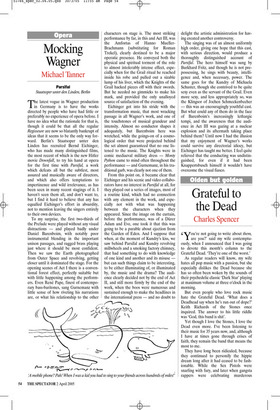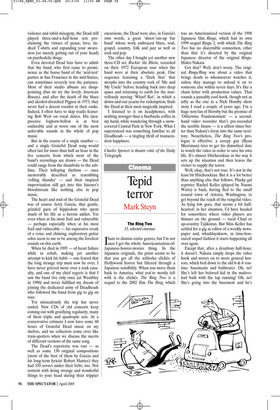Grateful to the Dead
Charles Spencer
‘You’re not going to write about them, are you?’ said my wife contemptu ously, when I announced that I was going to devote this month’s column to the Grateful Dead. ‘They’re one of the worst.’ As regular readers will know, my wife hates all pop music with a passion, but she especially dislikes the Dead because she has so often been woken by the sounds of their psychedelic classic ‘Dark Star’ playing at maximum volume at three o’clock in the morning.
But even people who love rock music hate the Grateful Dead. ‘What does a Deadhead say when he’s run out of dope?’ Keith Richards of the Stones once inquired. The answer to his little riddle was ‘God, this band is shit’.
Yet though I love the Stones, I love the Dead even more. I’ve been listening to their music for 35 years now, and, although I have at times gone through crises of faith, they remain the band that means the most to me.
They have long been ridiculed, because they continued to personify the hippie dream long after it had ceased to be fashionable. While the Sex Pistols were snarling with fury, and later when gangsta rappers were celebrating murderous violence and rabid misogyny, the Dead still played three-and-a-half-hour sets proclaiming the virtues of peace, love, tiedyed T-shirts and expanding your awareness (or merely getting out of your head) on psychedelic drugs.
Even devoted Dead fans have to admit that the band, who first came to prominence as the house band of the ‘acid-test’ parties in San Francisco in the mid-Sixties, can sometimes severely test the patience. Most of their studio albums are disappointing (but do try the lovely American Beauty), and after the death of the blues and alcohol-drenched Pigpen in 1973, they never had a decent vocalist in their ranks. Indeed, I often have to skip tracks featuring Bob Weir on vocal duties. His inexpressive foghorn-bellow is at best endurable and at worst one of the most unlovable sounds in the whole of pop music.
But in the course of a single number and a single Grateful Dead song would often last for more than half an hour in the live concerts from which most of the band’s recordings are drawn — the Dead could range from the shambolic to the sublime. Their lolloping rhythms — once memorably described as resembling ‘rolling thunder’ — and their inspired improvisation still get into this listener’s bloodstream like nothing else in pop music.
The heart and soul of the Grateful Dead was of course Jerry Garcia, that gentle, grizzled guru of hippiedom who spent much of his life as a heroin addict. Yet even when at his most frail and vulnerable — perhaps especially when at his most frail and vulnerable — his expressive croak of a voice and chiming, exploratory guitar solos seem to me to be among the loveliest sounds on this earth.
When he died in 1995 — of heart failure while in rehab, making yet another attempt to kick his habit — one feared that the long strange trip must now be over. I have never grieved more over a rock casualty, and one of my chief regrets is that I saw the band live only once (at Wembley in 1990) and never fulfilled my dream of joining the dedicated army of Deadheads who followed the band from gig to gig on tour.
Yet miraculously the trip has never ended. New CDs of old concerts keep coming out with gratifying regularity, many of them triple and quadruple sets. At a conservative estimate I now have some 60 hours of Grateful Dead music on my shelves, and we collectors come over like train-spotters when we discuss the merits of different versions of the same song.
The Dead’s repertoire was vast — as well as some 150 original compositions (most of the best of them by Garcia and his long-term lyricist Robert Hunter) they had 350 covers under their belts, too. Not content with doing strange and wonderful things to your head during their trippier excursions, the Dead were also, in Garcia's own words, a great ‘shoot-’em-up bar band’ whose work embraced blues, soul, gospel, country, folk and jazz as well as rock and pop.
The other day I bought yet another new three-CD set, Rockin’ the Rhein, recorded on their 1972 European tour when the band were at their absolute peak. One sequence featuring a ‘Dark Star’ that morphs into the country rock of ‘Me and My Uncle’ before heading back into deep space and returning to earth for the marvellously moving ‘Wharf Rat’, in which a down-and-out yearns for redemption, finds the Dead at their most magically inspired.
I listened to it on headphones, with nothing stronger than a Starbucks coffee in my hand, while wandering through a snowcovered Central Park in New York. What I experienced was something familiar to all Deadheads — a tingling thrill of transcendent happiness.
Charles Spencer is theatre critic of the Daily Telegraph.






























































 Previous page
Previous page